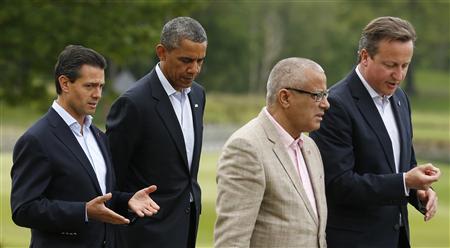By Alexei Anishchuk and Andrew Osborn
ENNISKILLEN, Northern Ireland (Reuters) - Russian President Vladimir Putin derailed Western efforts to remove Syrian leaderBashar al-Assad from power at the G8 summit on Tuesday and, hours after meeting U.S. President Barack Obama, said the Kremlin might sell more arms to Syria.
In a final communique after two days of intense talks, global leaders called for peace talks to be held as soon as possible to resolve the Syrian civil war. But it did not even mention Assad's name.
Putin, seemingly isolated at the summit, had clashed with other leaders continuously over Syria and resisted attempts to get him to agree to anything that would imply Assad should step down.
Speaking at the end of the summit held in a secluded golf resort in Northern Ireland, Putin struck a defiant tone. He told the West that sending weapons to rebels could backfire one day while he defended his own military contacts with the Syrian government.
"There are different types of supplies. We supply weapons based on legal contracts to a legal government...And if we sign these contracts (in the future), we will supply (more arms)."
Obama and his allies want Assad to cede power while Putin, whose rhetoric has become increasingly anti-Western since he was re-elected last year, believes that would be disastrous at a time when no clear transition plan exists.
Russia has been Assad's most powerful supporter as his forces struggle to crush an uprising in which 93,000 people have been killed since March 2011 and which is now drawing in neighboring countries.
It has vetoed two United Nations Security Council resolutions censuring the Assad government, widely criticized for the ferocity with which it has waged the war.
Syria is one of Moscow's last allies in the Middle East, where its influence has declined since the collapse of the Soviet Union. The Russian navy has a vital base at the Mediterranean port of Tartus.
The United States and its European and Gulf Arab allies have repeatedly called on Assad to surrender power and several times predicted his downfall since the conflict erupted. Recent battlefield gains by government forces against the rebels make that prospect unlikely anytime soon.
DISASTROUS CONSEQUENCES
In the final document, G8 leaders also called on the Syrian authorities and the opposition to commit to destroying all organizations affiliated with al Qaeda - a reflection of growing concern in the West that Islamist militants were playing a more dominant role in the rebel ranks.
British Prime Minister David Cameron, who chaired the summit, said separately after the talks that the West believed strongly that there was no place for Assad in a future Syria.
"It is unthinkable that President Assad can play any part in the future of his country. He has blood on his hands," Cameron told reporters at the resort tucked away on a lough amid rolling hills.
"You can't imagine a Syria where this man continues to rule having done such awful things to his people."
Cameron said the main breakthrough was an agreement that a transitional government with executive powers was needed and a deal to call for an investigation into chemical weapons use.
"We remain committed to achieving a political solution to the crisis based on a vision for a united inclusive and democratic Syria," the final communique read. "We strongly endorse the decision to hold as soon as possible the Geneva conference on Syria."
For his part, Putin renewed his criticism of U.S. plans to send weapons to Syrian rebels. He said G8 leaders had also expressed doubts that Assad's forces had used chemical weapons, the ostensible reason for stepped-up U.S. involvement.
"Let me assure you that not all G8 members believe it was used by the Syrian army. Some agree with our opinion that there's no such data," Putin said.
During the talks, Western powers faced strong resistance from Putin as they tried to hash out a statement with teeth that all G8 leaders could agree on.
Mostly looking tense throughout the meeting, Putin had faced a barrage of criticism over his Syria stance. Canadian Prime Minister Stephen Harper accused him of supporting "thugs" in Damascus. His meeting with Obama was frosty and both looked uncomfortable.
Russian Deputy Foreign Minister Sergei Ryabkov, speaking on the sidelines, said earlier that any debate about Assad's role in the resolution of the conflict was unthinkable.
"This would be not just unacceptable for the Russian side, but we are convinced that it would be utterly wrong, harmful and would completely upset the political balance," Ryabkov said.
Russia and the United States agree however that the warring sides should be brought together to discuss Syria's future at a peace conference as soon as July. But its timing was under question and one source said it would be delayed until August.
By failing to agree on Assad's fate, the different sides hit the same roadblock as they did at meeting in Geneva almost a year ago to the day. yahoo news



No comments:
Post a Comment